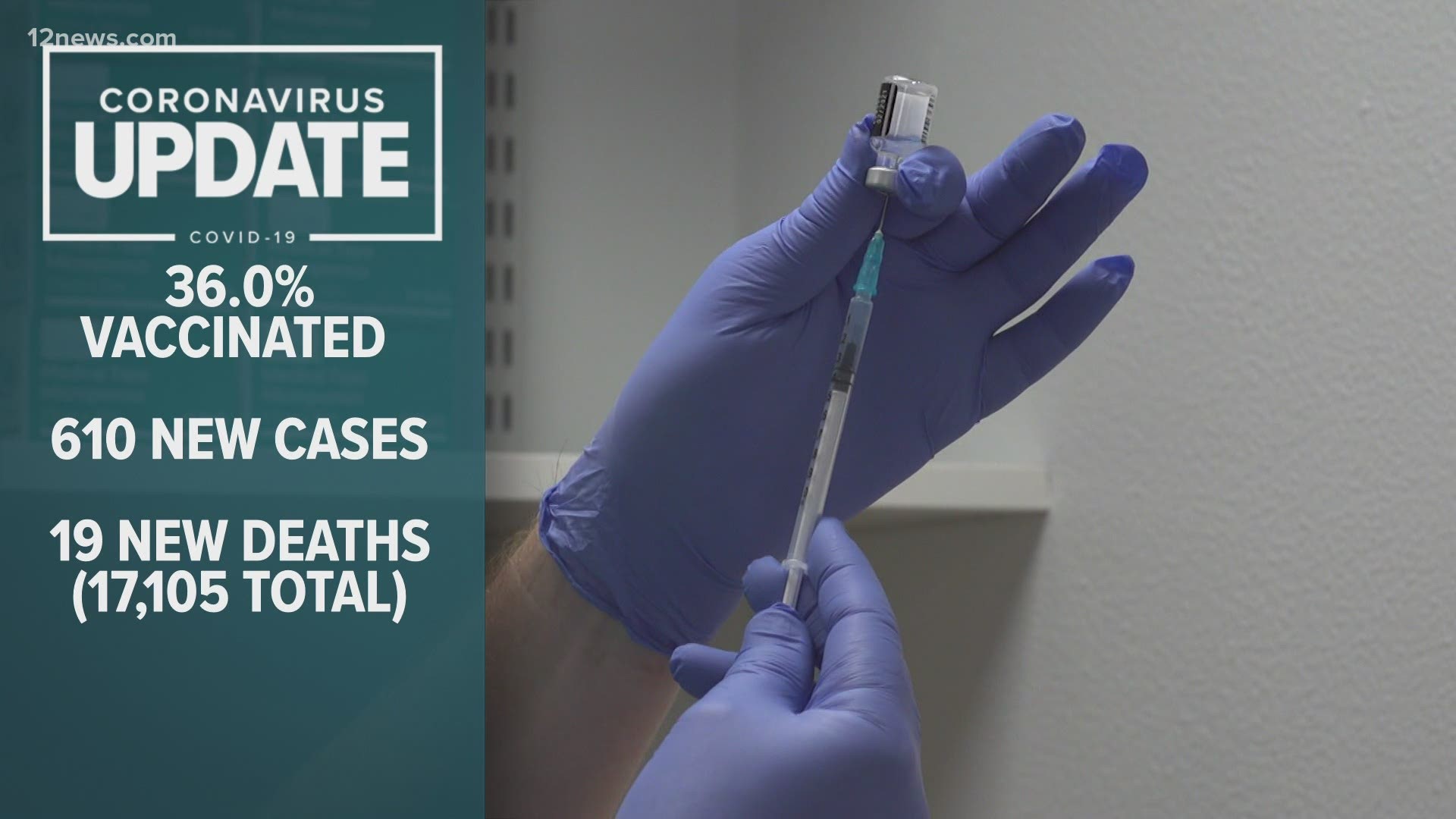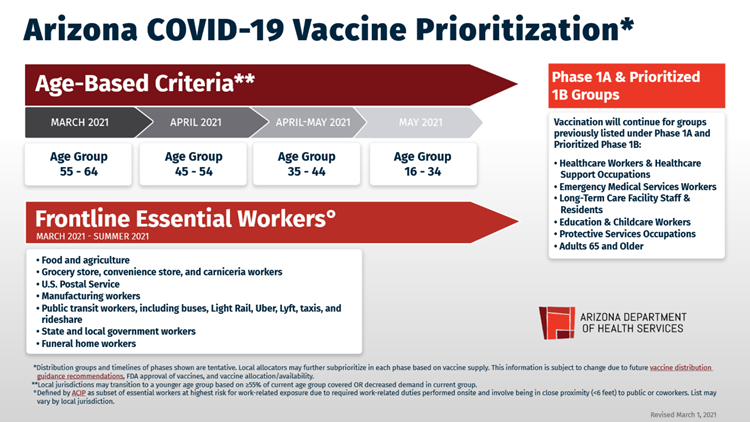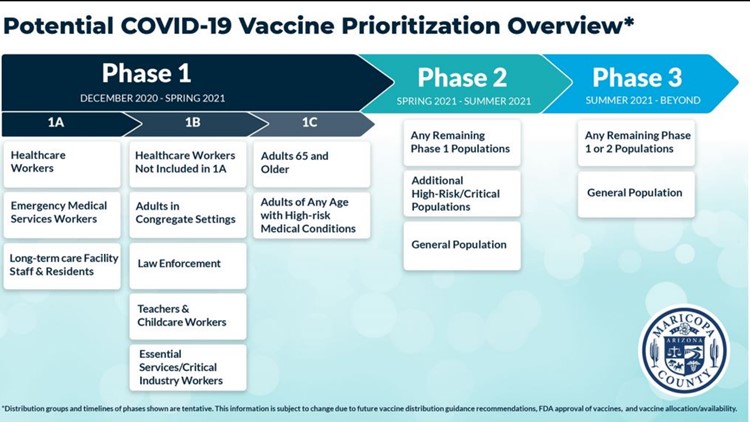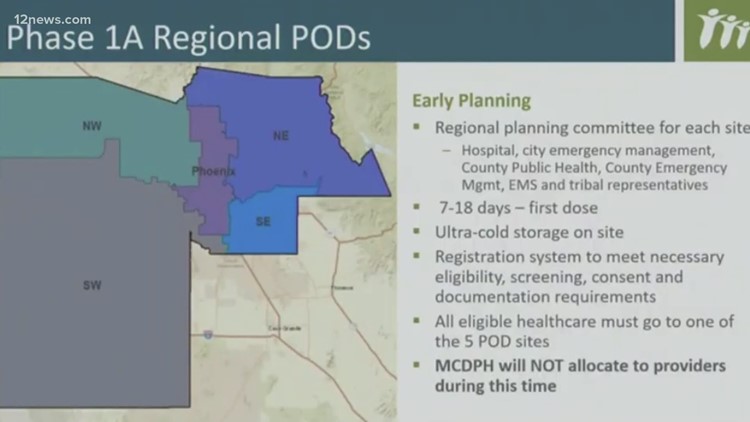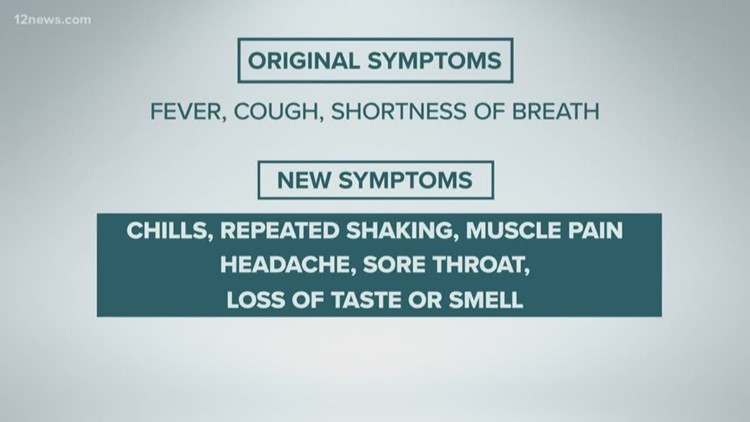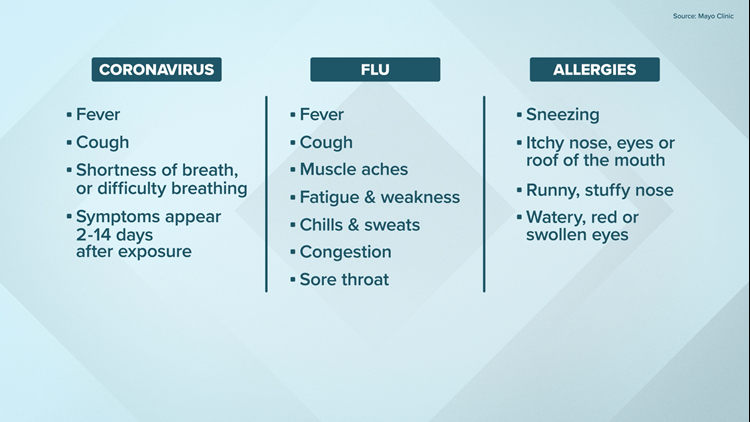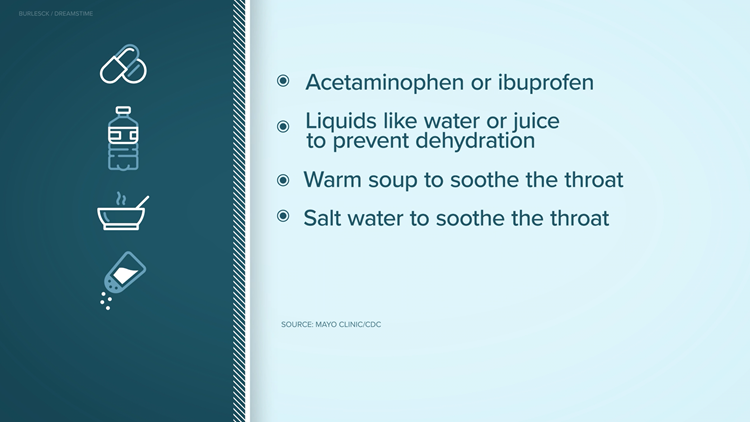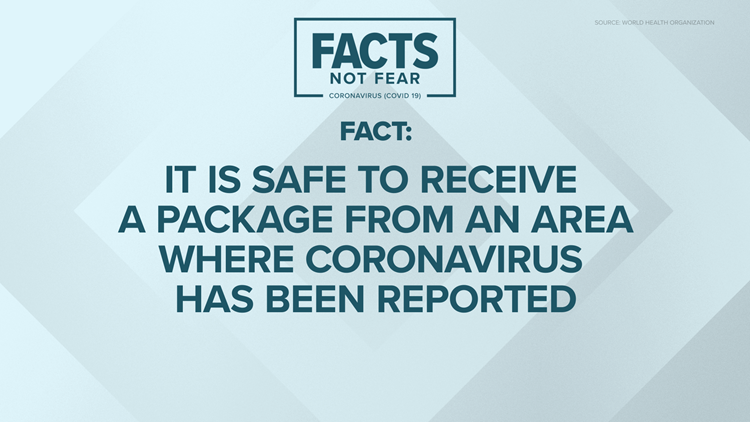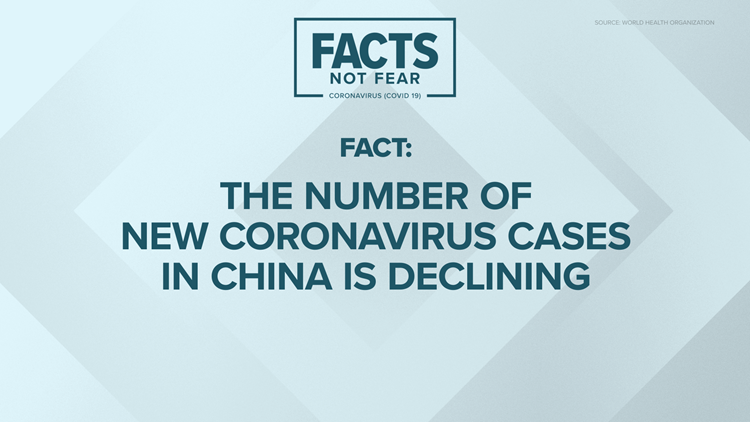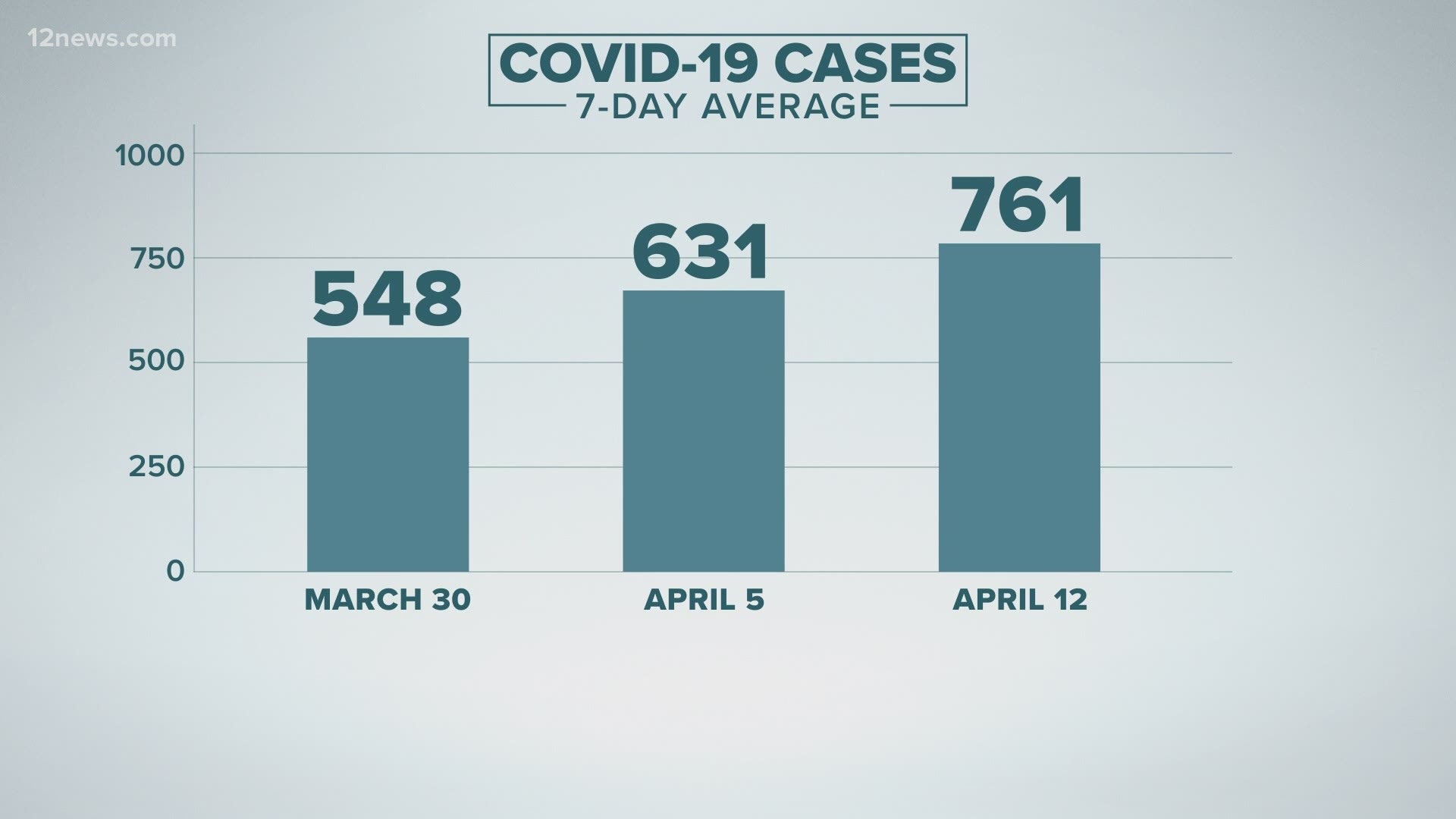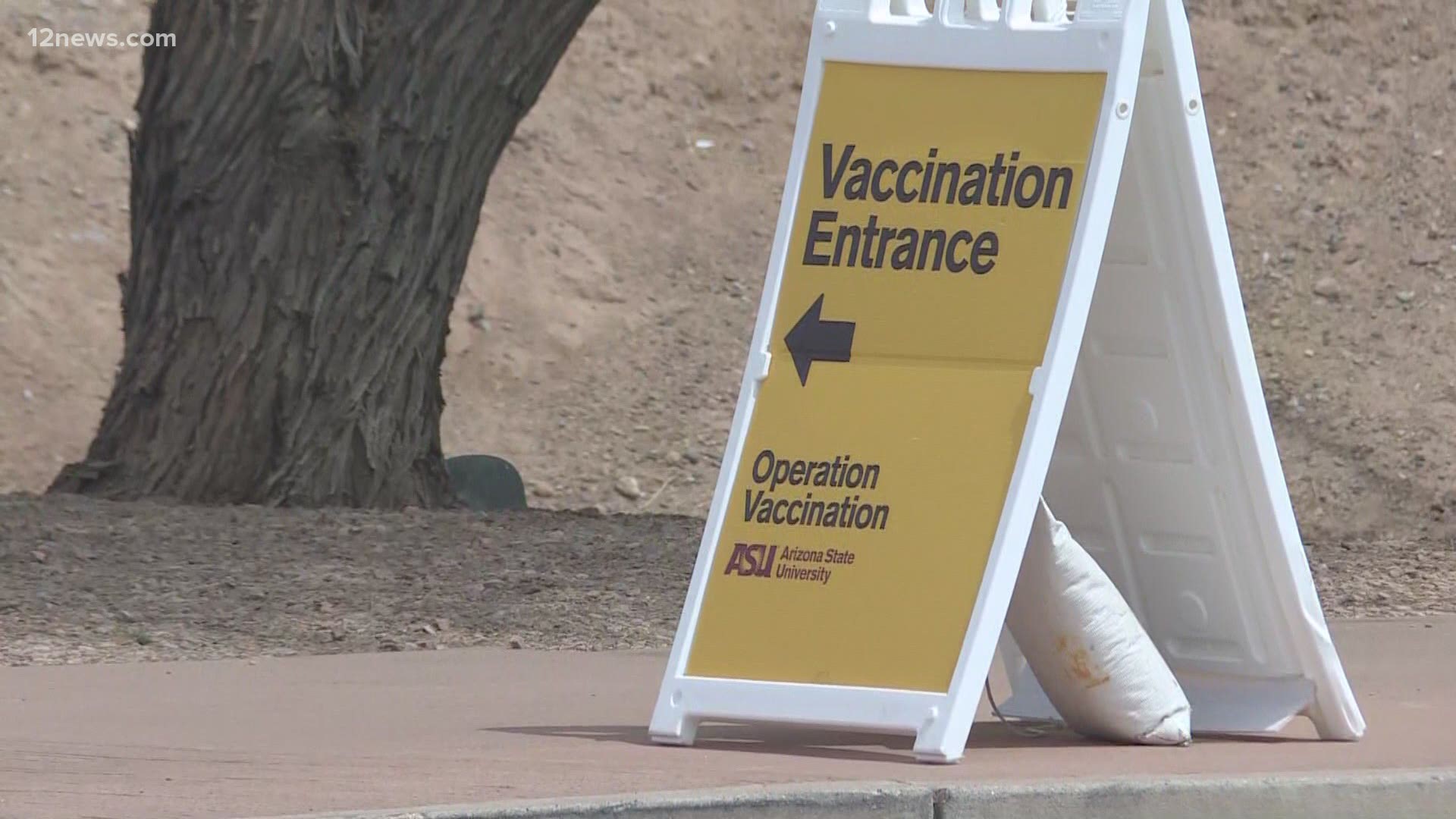12 News continues to track the changes with the coronavirus outbreak and vaccination efforts in Arizona with our daily live blog.
Here is the live blog for Tuesday, April 13.
Major updates:
- There have been 850,846 confirmed cases of coronavirus and 17,105 coronavirus-related deaths reported in Arizona as of Tuesday.
- There have been 4,167,194 total vaccines administered as of Tuesday.
- The state does not record how many people have recovered, but Johns Hopkins University estimates the number of people who have recovered
- You can find COVID-19 testing sites here
- Go to 12News.com/Vaccine to find more information on the COVID-19 vaccines
- Scroll down to see how many cases are in each ZIP code and additional information
COVID-19 cases reported in Arizona on Tuesday
There have been 850,846 confirmed cases of coronavirus and 17,105 coronavirus-related deaths reported in Arizona, according to the state health department data.
That's an increase from the 850,236 confirmed cases and 17,086 coronavirus-related deaths reported on Monday.
A week ago, there were 845,480 confirmed cases of coronavirus and 16,996 deaths reported in Arizona.
VERSION EN ESPANOL: Coronavirus en Arizona el 13 de abril: 610 nuevos casos, 19 muerte se reportan el martes
610 new cases, 19 new deaths reported Tuesday
The Arizona Department of Health Services reported 610 new cases and 19 new deaths on Tuesday.
Arizona has administered 4,167,194 total vaccines COVID-19 vaccine doses as of Tuesday.
The department reports the number of new cases on the day the cases were reported to them by counties and hospitals, not on the day when someone was diagnosed with the virus.
There were 12,448 cases reported on the collection date of Jan. 4, the day with the most collected diagnoses so far. The day with the second-most collected diagnoses so far was on Jan. 5, with 11,770 cases. That is subject to change.
Health officials said the day with the highest number of deaths was Jan. 18, when 177 people died. The day with the second-highest number of deaths was Jan. 13, when 172 people died. That is subject to change.
Arizona reached 800,000 coronavirus cases on Feb. 17, 700,000 on Jan. 22, 600,000 on Jan. 9, 500,000 on Dec. 28, 400,000 on Dec. 12, 300,000 on Nov. 23, 200,000 on Aug. 27, 100,000 on July 6 and 50,000 cases on June 21.
The state reached 17,000 coronavirus deaths on April 7, 16,000 on March 2, 15,000 on Feb. 17, 14,000 on Feb. 6, 13,000 on Jan. 29, 12,000 on Jan. 22, 11,000 on Jan. 15, 10,000 on Jan. 9, 9,000 on Jan. 1, 8,000 on Dec. 22, 7,000 on Dec. 9, 6,000 on Nov. 3, 5,000 on Aug. 29, 4,000 on Aug. 6, 3,000 deaths on July 23, 2,000 on July 9 and 1,000 on June 5.
Health officials continued to stress that people should continue social distancing, wearing masks in public, and stay home when possible.
Arizona, Maricopa County health officials recommend pause on use of Johnson & Johnson COVID-19 vaccine
The Arizona Department of Health Services and Maricopa County health officials announced Tuesday that they were recommending pausing the use of the Johnson & Johnson COVID-19 vaccines.
The announcements came after the Centers for Disease Control and Food and Drug Administration recommended a temporary pause on the use of the vaccine until they can review data involving six cases of an extremely rare type of blood clot.
So far in Arizona, 226,300 doses of the Johnson & Johnson vaccine have been allocated in Arizona, with approximately 122,000 administered.
The department is working with local public health departments and community partners to communicate the recommended pause in Johnson & Johnson vaccine administration.
Anyone who had appointments to receive the Johnson & Johnson can schedule an appointment for the Pfizer or Moderna vaccine at azdhs.gov/findvaccine.
“While the occurrence of this rare blood clot are extremely rare compared to the number of doses of the Johnson & Johnson vaccine administered nationwide, we are following the guidance of the CDC and FDA out of an abundance of caution and we will continue to work with our federal and statewide partners about the status of the vaccine,” Dr. Cara Christ, ADHS director, said in a statement.
“The COVID-19 vaccine is safe and effective and is one of the best tools we have to reduce the spread of the disease in Arizona. I encourage everyone to get vaccinated against COVID-19.”
"The primary goal is to understand all of the information available and to ensure that the health care provider community is aware of the potential for this rare adverse event and can recognize and manage this unique type of blood clot," Maricopa County officials said in a statement.
"It is important for the public to know that this rare blood clot has not been reported following receipt of the Pfizer or Moderna vaccines," the statement continued.
"Maricopa County is working closely with our partners to keep as many scheduled vaccine events running as possible by substituting another available vaccine."
Mohave County pauses Johnson & Johnson vaccine distribution
Mohave County health officials announced Tuesday they will follow CDC guidelines and stop the distribution of the Johnson & Johnson vaccine.
This applies to chain stores and pharmacies that have been distributing the shot which is allegedly been linked to severe blood clots in extremely rare instances.
The county will only be distributing the Moderna vaccine for the time being.
Anyone who has already been given the J&J vaccine and has developed severe side effects should contact their health provider.
Pima County halts use of Johnson & Johnson vaccine
Pima County health officials announced Tuesday they will follow CDC guidelines and stop the distribution of the Johnson & Johnson vaccine.
The Pima County Health Department has given 24,600 doses Johnson & Johnson’s COVID-19 vaccine, primarily at its mobile points of distribution and has received no reports of adverse reactions.
The first shipments of the vaccine arrived in the County on March 4. The County will give the Moderna vaccine in place of the J&J vaccine and does not anticipate the need to cancel any appointments or vaccination events.
“Vaccines available today are safe and effective,” said Dr. Theresa Cullen, Pima County Health Department director. “And although out of an abundance of caution we have paused the use of J&J, we urge unvaccinated to continue to keep getting vaccinated.”
Dr. Deepta Bhattacharya, associate professor of immunobiology at the University of Arizona, agreed.
“The estimated risk of a blood clot from the J&J vaccine is about 1 in a million,” Bhattacharya said. “The overall risk from dying if you get COVID-19 is about 1 in 100.
Pima County residents who received the J&J vaccine and have experienced symptoms of severe headache, abdominal pain, leg pain or shortness of breath within three weeks after vaccination should contact their primary care physician immediately.
Arizona moves COVID-19 vaccination site to ASU's Tempe campus
The state-run vaccination site at Phoenix Municipal Stadium relocated to the Desert Financial Arena on Arizona State University’s Tempe campus on Monday.
The shift will move operations indoors at the university's venue for basketball and other large-scale indoor events as the weather continues to heat up.
Anyone who has already scheduled a second-dose appointment at Phoenix Municipal Stadium for Monday and later are being informed of this change.
Vaccinations will be provided in the arena on the main concourse and arena seating will be available for the observation period after vaccination.
“Arizonans have come together to protect our communities and expand vaccinations quickly,” Gov. Doug Ducey said in a statement.
“I’m grateful to all the volunteers, staff members and health care professionals who are helping Arizonans get vaccinated, and to Arizona State University for their continued partnership.”
“Arizona State University has been an invaluable partner and resource as the state of Arizona has developed mass-vaccination sites that have now administered more than 1 million doses of COVID-19 vaccine,” Dr. Cara Christ, director of the Arizona Department of Health Services, said in a statement.
“Phoenix Municipal Stadium has been a tremendous success, and we look forward to continued progress as this operation moves indoors at ASU.”
The Phoenix Municipal Stadium site has administered 171,202 doses since opening up on Feb. 1.
The Arizona Department of Health Services will release new appointments at state-run sites at 11 a.m. every Friday.
Registration is available at podvaccine.azdhs.gov or by calling 844-542-8201 between 8 a.m. and 5 p.m, 7 days a week. Both resources offer assistance in English and Spanish.
Arizona to open another state-run COVID-19 vaccine site in Flagstaff
The Arizona Department of Health Services will open another state-run COVID-19 vaccination site, this time in Flagstaff, later this month.
The site will open on April 19 at Northern Arizona University's Union Fieldhouse.
It will operate from 7 a.m. to 5 p.m. seven days a week, but could expand to 7 p.m.
Appointments were available starting at 11 a.m. Friday, by visiting podvaccine.azdhs.gov or calling 1-844-542-8201. Both have resources available in English and Spanish.
It will offer around 1,000 appointments per day to start but will eventually be able to administer more than 4,000 doses daily.
Arizona to open new state-run COVID-19 vaccination site at Scottsdale's WestWorld
Gov. Doug Ducey and the Arizona Department of Health Services announced the state will be opening another COVID-19 vaccination site later this month in Scottsdale at WestWorld.
The indoor site is expected to open on April 22 and offer 3,000-4,000 appointments daily from 7 a.m. to 5 p.m.
The announcement comes as Arizona opened its first indoor drive-thru vaccine site in Mesa at a distribution center operated by Dexcom on Ray Road near the Loop 202 Santan Freeway and Power Road.
The Mesa site replaced the site at Chandler-Gilbert Community College as Arizona turns to indoor options as the heat picks up.
Arizona to move COVID-19 vaccination site from State Farm Stadium to Gila River Arena
The Arizona Department of Health Services will transition the COVID-19 vaccination site in the West Valley from State Farm Stadium to Gila River Arena.
The State Farm Stadium site is an outdoor, drive-thru location and the Gila River Arena site will be an indoor location.
The Gila River Arena COVID-19 vaccination site will open on April 23. It will be open from 7 a.m. to 7 p.m. each day. It will have the capacity to administer 1,000 shots per hour.
The State Farm Stadium site will move to nighttime hours starting Monday to avoid heat and will stop all operations on the morning of April 23.
The State Farm Stadium site is currently the state's largest vaccination site and has been described as a “national model” by President Joe Biden.
“Arizona is so thankful to the Arizona Cardinals, Michael Bidwill and the Bidwill family, and all of the partners who stepped up to help make our first state-run vaccination site a national success,” Ducey said in a statement.
“This is a true team effort, and the mission to get Arizonans vaccinated continues with this new location.”
“This site will continue to be a national model for mass vaccination as we shift outdoor operations to indoor locations," Dr. Cara Christ, director of the Arizona Department of Health Services, said in a statement.
"Gila River Arena and city of Glendale, in partnership with ADHS and the Arizona Cardinals, are making it possible to continue vaccinating while the Glendale operation gets closer to administering 1 million doses.”
Anyone who wants to register for a vaccine at this new site can go online at podvaccine.azdhs.gov or call 844-542-8201 between 8 a.m. and 5 p.m. Both resources offer assistance in English and Spanish.
Navajo Nation reports no COVID-19 deaths for 2nd day in row
The Navajo Nation on Monday reported two new confirmed COVID-19 cases, but no additional deaths for the second consecutive day.
The latest numbers brought the pandemic totals on the tribe’s reservation to 30,267 cases with 1,262 known deaths.
Tribal officials had ordered a weekend lockdown over fears that a new variant could drive another deadly surge.
The Stay-At-Home order required all Navajo Nation residents to refrain from unnecessary travel to help limit the spread of the virus, including a new and more contagious strain.
The first confirmed case of the COVID-19 B.1.429 variant on the reservation that covers parts of Arizona, New Mexico and Utah was confirmed last week.
The above article is from The Associated Press.
Here is the latest information on COVID-19 vaccines in Arizona
The Arizona Department of Health Services said more than 4.1 million doses of COVID-19 vaccine have been administered as of Tuesday.
Who can get a COVID-19 vaccine?
The state and Maricopa and Pima counties have expanded vaccine eligibility to Arizonans 16 and older. Other counties are offering vaccines to people in Phase 1B. Gila County has extended vaccines to some people in Phase 1C and Mohave County opened vaccines to all adults. Learn more about the phases here.
How can I sign up for a COVID-19 vaccine?
You can sign up for a vaccine through the state here or find more information about finding up through the counties here.
Where can I get a COVID-19 vaccine?
There are five locations where the state is administering vaccines: State Farm Stadium in Glendale, Desert Financial Arena in Tempe, Dexcom in Mesa, University of Arizona's Tucson campus and Yuma Civic Center in Yuma. All other locations are run through the individual counties or federal programs.
Where can I find more information on a COVID-19 vaccine?
You can find more vaccine information at 12News.com/Vaccine.
COVID-19 data dashboard now includes vaccine information
The Arizona Department of Health Services updated its COVID-19 data dashboard to include information including vaccination numbers and demographic data.
The new information can be found on the dashboard in the tab right next to the summary tab where daily coronavirus cases, deaths, and testing numbers are updated.
You can see the updated dashboard here.
Arizona health department sets up hotline to report businesses
The Arizona Department of Health Services has set up two ways for people to report local businesses that are not following COVID-19 guidelines.
People can report businesses through a hotline or through an online form:
- Submit a complaint online at www.azhealth.gov/complianceCOVID19
- Calling the COVID-19 Compliance Hotline at 1-844-410-2157
“There’s a role for the public as well: If you believe a business isn’t following these requirements, which were established for the safety of customers, employees, and the broader public, ADHS encourages you to share your concerns so local and state officials can follow up as needed,” AZDHS said in a statement.
Free masks available for some Arizonans
The Arizona Department of Health Services announced that some Arizonans would be able to get free masks from the state.
The department partnered with Hanes to provide free face masks to Arizona’s most vulnerable populations.
Anyone who is part of a vulnerable population (including, but not limited to, individuals with medical conditions or individuals age 65 or older), a student (or parents on behalf of students), school staff member or who may not be able to purchase one is able to get a free mask.
Each other will provide five washable, reusable cloth face masks, one order per household.
The department hopes to give out two million cloth face masks.
Anyone with questions can visit the department's FAQs page or contact Hanes at 1-800-503-6698.
Arizona releases ZIP code locations of coronavirus cases, other data
The Arizona Department of Health Services has released expanded data points regarding coronavirus cases in the state.
The AZDHS website now features the location of confirmed cases in Arizona by zip code.
You can see the current ZIP code map here and can find yours by clicking around or searching for your ZIP code in the top right of the map.
More information on coronavirus cases from Tuesday
There have been 850,846 confirmed cases of coronavirus and 17,105 coronavirus-related deaths reported in Arizona.
That's an increase from the 850,236 confirmed cases and 17,086 coronavirus-related deaths reported on Monday.
There were 610 new coronavirus cases reported on Tuesday, a decrease from the 675 new cases reported on Monday.
There were 19 new coronavirus-related deaths reported on Tuesday, an increase from the zero new deaths reported on Monday.
There were 12,448 cases reported on the collection date of Jan. 4, the day with the most collected diagnoses so far. The day with the second-most collected diagnoses so far was on Jan. 5, with 11,770 cases. That is subject to change.
Health officials said the day with the highest number of deaths was Jan. 18, when 177 people died. The day with the second-highest number of deaths was Jan. 13, when 172 people died. That is subject to change.
In total, 13,759 new diagnostic tests were reported on Tuesday, a decrease from the 14,646 new tests reported on Monday.
There have been a total of 8,818,384 diagnostic tests reported to the state as of Tuesday.
10.6% of those tests have been positive as of Tuesday, the same since Saturday.
Here's a breakdown of the number of cases reported in each county:
- Maricopa: 529,271
- Pima: 113,822
- Pinal: 50,383
- Coconino: 17,368
- Navajo: 16,004
- Apache: 11,254
- Mohave: 22,344
- La Paz: 2,450
- Yuma: 36,933
- Graham: 5,523
- Cochise: 11,747
- Santa Cruz: 7,879
- Yavapai: 18,447
- Gila: 6,853
- Greenlee: 568
Click on the links below to find more information from each county's health department:
COVID-19 is believed to be primarily spread through coughs or sneezes.
It may be possible for the virus to spread by touching a surface or object with the virus and then a person touching their mouth, nose or eyes, but this is not thought to be the main method of spread, the CDC says.
You should consult your doctor if you traveled to an area currently affected by COVID-19 and feel sick with fever, cough or difficulty breathing.
The best way to prevent COVID-19 and other respiratory diseases is to:
- Wear face coverings while in public.
- Practice social distancing while in public.
- Avoid close contact with people who are sick.
- Avoid touching your eyes, nose, and mouth.
- Stay home when you are sick.
- Cover your cough or sneeze with a tissue, then throw the tissue in the trash.
- Clean and disinfect frequently-touched objects and surfaces using a regular household cleaning spray or wipe.
- Wash your hands often with soap and water for at least 20 seconds. If soap and water are not readily available, use an alcohol-based hand sanitizer.
You can text FACTS to 602-444-1212 to receive more information on the coronavirus and to ask questions.
Coronavirus facts you should know
See videos featuring the latest news about COVID-19, including doctor responses to questions about the coronavirus on our 12 News YouTube page here.

